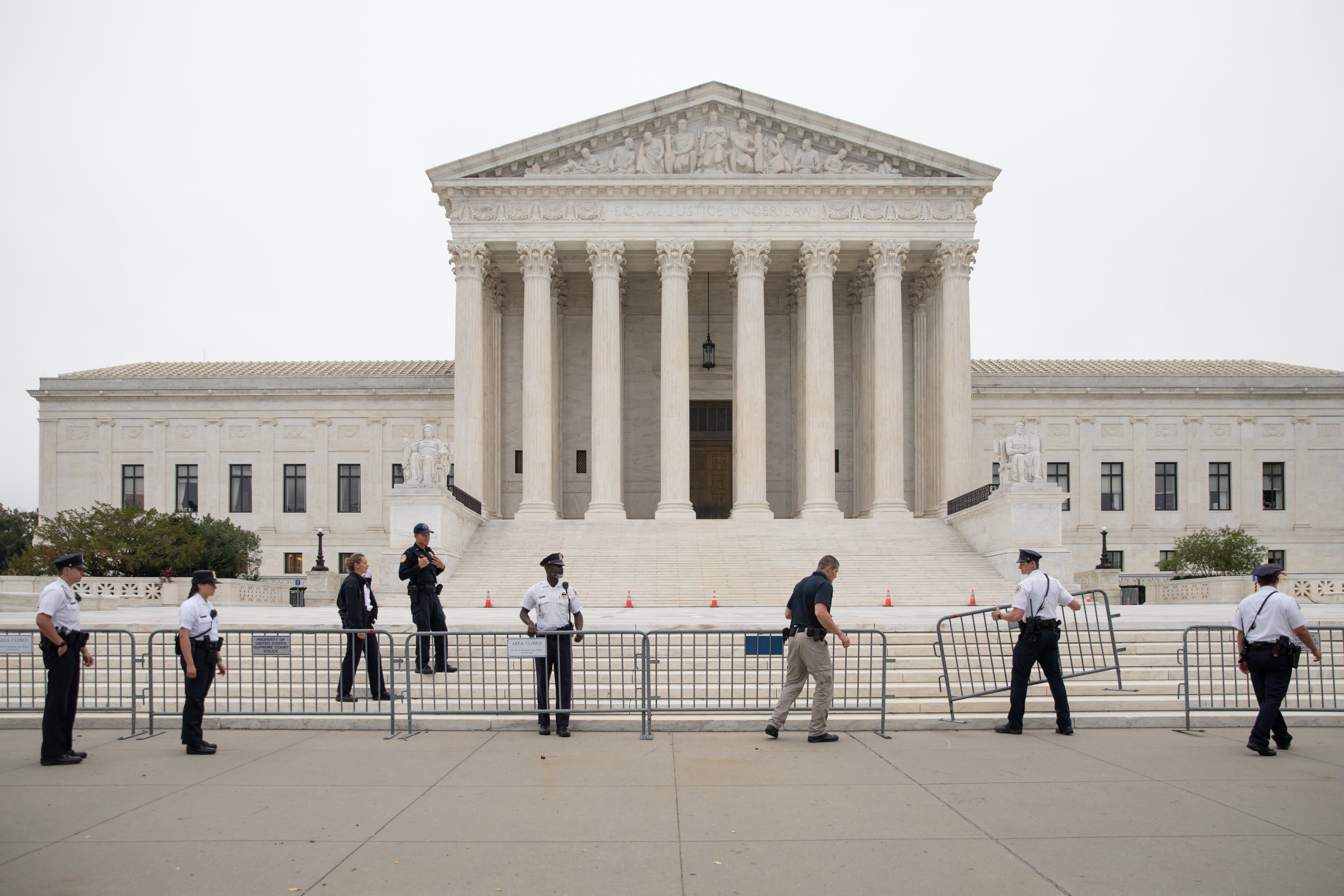
Supreme Court signals it will side with Kentucky attorney general in bid to defend abortion law
Police officers set up barricades in front of of the U.S. Supreme Court in Washington, D.C., U.S., on Tuesday, Oct. 12, 2021.
Emily Elconin | Bloomberg | Getty Images
The Supreme Court on Tuesday considered a Republican attorney general’s bid to defend a restrictive Kentucky abortion law, with some liberal justices sounding skeptical that a lower court was right to reject that request to intervene.
The case is not the only abortion-related battle that the court, stacked 6-3 with conservative justices, is set to consider this term. The court already waded into the polarizing issue when it voted 5-4 not to block a Texas law banning most abortions after as early as six weeks of pregnancy. And the justices will hear arguments Dec. 1 in a pivotal case challenging the right to an abortion before fetal viability established by Roe v. Wade.
The Kentucky law, H.B. 454, would largely ban abortions performed with the “dilation and evacuation” procedure, the most common method used for second-trimester pregnancies. It was signed into law in 2018, but a district court declared it unconstitutional and an appeals court upheld that ruling.
Kentucky’s health secretary opted not to pursue further appeal of the decision — but Daniel Cameron, the state’s Republican attorney general, tried to intervene to seek another hearing in defense of the law. The U.S. Court of Appeals for the Sixth Circuit rejected that bid, saying Cameron’s motion came too late.
Kentucky Attorney General Daniel Cameron stands on stage in an empty Mellon Auditorium while addressing the Republican National Convention on August 25, 2020 in Washington, DC.
Chip Somodevilla | Getty Images
In the petition for the Supreme Court to consider the case, attorneys for Cameron argued the attorney general “has not only the power, but also the duty” to jump in when another state official declines to defend state law. He is asking the high court to vacate the appeals court’s judgment and send the case back for further consideration.
The surgical center’s brief in reply countered that Cameron’s bid to intervene is invalid, in part because the attorney general’s office had previously agreed to be bound by the outcome of the case.
Tuesday’s oral arguments focused not on the merits of the Kentucky abortion law, but rather hinged on whether Cameron should be allowed to intervene after the appellate court delivered its ruling and after the rest of the state’s administration had opted out.
“If there’s no prejudice to anybody, and I can’t see where there is, why can’t he just come in and defend the law?” Justice Stephen Breyer asked a lawyer representing EMW Women’s Surgical Center, Kentucky’s only licensed abortion provider, against Cameron.
“Now, he may lose,” Breyer said, “and he may lose for the reasons that you say. But I don’t see why he can’t, if Kentucky allows him to make the argument, why can’t he make the argument?”
Volunteer clinic escorts wait for patients outside the EMW Women’s Surgical Center in Louisville, Kentucky, U.S., on Tuesday, Sept. 28, 2021.
Luke Sharrett | Bloomberg | Getty Images
Breyer later said he may be confused about the facts of the case. But Justice Elena Kagan, another liberal, picked up on the point that much of the conflict arose from the fact that Kentucky’s leadership had switched parties over the course of litigation.
Then-Gov. Matt Bevin, a Republican, signed H.B. 454 into law in March 2018. When the surgical center filed suit shortly after, it named then-Attorney General Andy Beshear, a Democrat, as a defendant, but his office was soon dismissed from the case. Later, as the case was being appealed, Beshear was elected Kentucky’s governor and Cameron was elected attorney general. The state health secretary, still involved in the lawsuit, continued to defend the law until after the appellate ruling, when he said he would no longer do so.
Cameron’s lawyers told the court that the attorney general tried to intervene within two days of hearing that the secretary would stop defending the law.
“There’s a real-world way in which that seems to matter a lot. I mean, that creates the problem here, which is that there’s nobody left defending the state’s law,” Kagan said.
“And I think what Justice Breyer was saying is, ‘Gosh, that would be an extremely harsh jurisdictional rule'” if no one was willing to defend the law, even though there are parts of Kentucky’s government that still want the law defended, she said.
The lawyer, Alexi Kolbi-Molinas of the American Civil Liberties Union, replied that “harsh results don’t change whether or not a jurisdictional rule is imposed.”
Stay connected with us on social media platform for instant update click here to join our Twitter, & Facebook
We are now on Telegram. Click here to join our channel (@TechiUpdate) and stay updated with the latest Technology headlines.
For all the latest Health News Click Here
For the latest news and updates, follow us on Google News.

